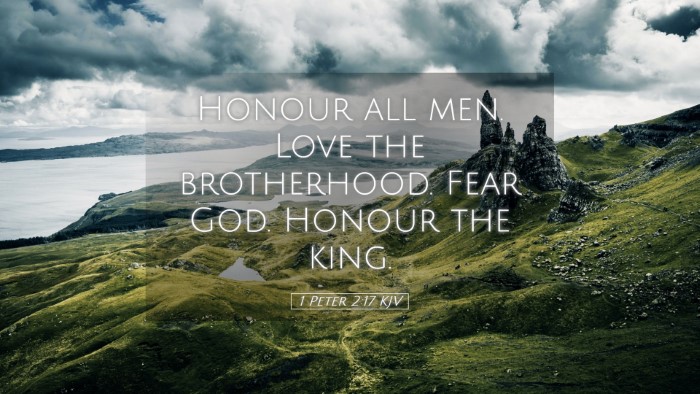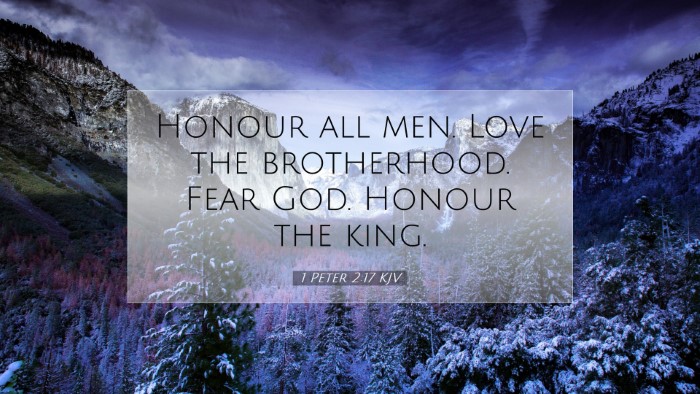Commentary on 1 Peter 2:17
Verse: "Honor all men. Love the brotherhood. Fear God. Honor the king."
Introduction
In 1 Peter 2:17, the apostle Peter provides a succinct yet profound set of directives aimed at guiding Christian conduct in relation to society and authority.
This verse encapsulates the essence of Christian ethics—submitting to and honoring both God and mankind.
In this commentary, we will explore the significance of these commands and how they are interpreted through various public domain commentaries.
Exposition of the Verse
The call to honor encompasses a broad spectrum of relationships, from individual interactions to the more complex dynamics involving governance and authority.
Peter's instruction can be broken down into four key components: honoring all men, loving the brotherhood, fearing God, and honoring the king.
1. Honor All Men
Matthew Henry's Insight:
Henry emphasizes the universal application of this command, noting that every human being deserves a degree of respect as they are made in the image of God.
He points out that this honor is not contingent upon social status or personal character but is a recognition of inherent dignity.
Adam Clarke's Perspective:
Clarke elaborates on this by arguing that treating all with honor fosters harmony in society.
He suggests that the Christian community should lead by example, exhibiting love and respect in all dealings, which can lead non-believers to inquire about the faith.
2. Love the Brotherhood
Albert Barnes' Commentary:
Barnes emphasizes the necessity of love among fellow believers, identifying this love as a distinct mark of the Christian faith.
He asserts that this love is meant to be active and self-sacrificial, reflecting the love of Christ for the Church.
This command speaks to the communal aspect of Christianity, urging believers to bond closely with one another, support each other, and manifest Christ's love collectively.
3. Fear God
Matthew Henry's Thoughts:
Henry beautifully articulates that fearing God is paramount for believers; it is a reverent acknowledgement of God's sovereignty and holiness.
He argues that the fear of God compels one to live righteously and to observe His commandments as the foundation of moral conduct.
Adam Clarke's Emphasis:
Clarke emphasizes that the fear of God not only leads to personal piety but also informs our interactions with others.
It creates a framework within which we can honor and love others, for it aligns our actions with divine principles.
4. Honor the King
Albert Barnes' Commentary:
Serving under authority is a significant theme in Peter's writings. Barnes interprets the imperative to honor the king as a reminder that civil authority is instituted by God.
This principle promotes a healthy respect for governance and the rule of law, crucial for societal stability.
Matthew Henry's View:
Henry also notes that this command is particularly pertinent to the specific audience Peter addresses, which included Christians facing persecution.
He asserts that honoring the king is essential, even when it may be challenging due to unjust leadership.
Theological Implications
The directives in this verse present a robust framework for understanding the Christian's role in sociopolitical contexts.
They challenge believers to embody humility and honor, which often stands in stark contrast to worldly values.
The dual call to respect authority while maintaining allegiance to God necessitates a delicate balance—one that relies on spiritual discernment and strength.
Practical Applications
- Promote Unity: Foster a culture of love and support among believers. This can be done through community groups and outreach programs.
- Exhibit Respect: Engage with individuals across all walks of life with dignity, recognizing the shared human experience.
- Emphasize Submission: Teach believers to view civil authorities through the lens of Scripture, understanding that respect for authority is a reflection of their respect for God.
Conclusion
1 Peter 2:17 encapsulates a profound call to honor and love that transcends personal feelings and societal norms.
As believers navigate a world that often contradicts these principles, they are reminded of their higher calling—to honor God, manifest love within the brotherhood, and respect those in authority.
The reflections from prominent commentaries collectively underscore the transformative power of embodying these instructions, both for individual Christians and for the Church as a whole.


